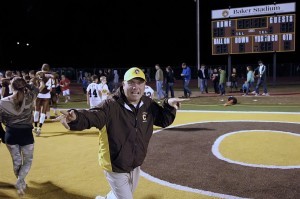Blog: Brown Beginnings, Issue 4
Choosing whom to write about might be the most difficult task for any writer. It’s certainly the most important, as every writer needs a muse.
There are two great quotes about this topic from two writers I admire. One is from Gary Smith, a long time writer for Sports Illustrated:
“All a profile is, is figuring out the central complications of someone’s life, and how on a daily basis they go about solving it.”
The other is Wright Thompson, a writer from ESPN the Magazine:
“It’s both people I am interested in and people I imagine might be dealing with things in their lives, or something they are struggling with that I might identify with.”
What Thompson and Smith are saying is how the best protagonists are complicated individuals. They are three dimension figures, possessing a unique back story that makes them often quirky, charismatic and flawed. Ever read a biography of Abraham Lincoln? General George Patton? Or Joe DiMaggio? They are three of the most famous people in our nation’s history. What made them compelling was not because they always did the right thing. Save those characters for a Disney movie.
On a sports team, the obvious source of tension comes from the head coach. At Carmel Catholic, that is Andy Bitto.
I knew early on that Coach Bitto would be a good protagonist for the book. First off, his position alone–head coach of a successful football program–makes him important within a community. Everyone has an opinion about the football coach (often shaped through an subjective prism), no matter how successful. And Coach Bitto is successful. In the 10 years before the 2010 season I spent with the Corsairs, Carmel won 105 games. No head coach in Lake County won more over that span. So as I began my reporting for the book, there certainly was a curiosity factor. How does he do it? What we find is the ‘how’ has nothing to do with the schematics of football.
One of the best definitions of charisma is “someone who takes unfailing delight in being who they are.” This perfectly sums up Coach Bitto.
The week before the regular season started in August of 2010, Carmel had their annual scrimmage. I walked behind Coach Bitto as he approached the sidelines. There were a bunch of youth football coaches and players there, milling about, waiting for the game to start. Bitto stopped and shook hands with each coach, called them by name and to numerous aspiring high school football players uttered, “You want to come to Carmel? Get good grades, stay out of trouble.” I understand the political side of the job–Carmel is a no boarder, private school. For a football coach, some filibustering is an occupational necessity. But this was no act. He came across as genuine. These scenes would repeat over and over again. This was someone who took unfailing delight in being who he was.
So much that shapes who we are is a result of where we come from. As a reporter, it is essential to dig into the past of a subject to help inform how he or she is presented to a reader. I interviewed about a dozen people who knew Coach Bitto–former teammates, classmates, coaches. Consistent from all sources was that he was a people person. He was a man of deep faith, who loved his family, his players, and Carmel. This became apparent to me in early interactions with him. Not apparent, and what took some time, was identifying the struggle, the as Gary Smith called it, “the central complication” in his life. This is where the tension comes in. This is what makes for a good story. This excerpt from the book sheds some light on this question:
In October of 1984, Bitto’s senior season at Ball State, he was getting ready to head to practice. The phone rang. “It was the only time Dad ever called me,” Bitto says. Mr. Bitto had news: His daughter, Andy’s sister, had been in a car accident. She didn’t survive. “I remember falling on the ground like my legs didn’t exist.” He got up and drove to the stadium for practice. It was a workday after all, and the Cardinals had a game Saturday. Bitto was putting on his uniform when he told a teammate what had happened. “He started bawling. I was still in shock. I hadn’t cried yet. I told him I need to get out of here, and he was like ‘Damn right. What are you doing here?’”
Bitto was home for several days. Not once did he receive a phone call from his coaches. “I’m sure they were occupied, but you couldn’t take five or 10 minutes to call?” Bitto says. “They could have sent one of the coaches or a graduate assistant to represent the team. Didn’t do it. Maybe it wasn’t that important. I certainly didn’t feel that important.”
Abraham Lincoln once said: “Adhere to your purpose and you will soon feel as well as you ever did. On the contrary, if you falter, and give up, you will lose the power of keeping any resolution, and will regret it all your life.”
For Coach Bitto, and for many of us, it took a life tragedy to aid him in finding his purpose. That purpose is what makes him a three dimensional figure–engaging, confounding, provocative and ultimately, relatable. And one of the compelling characters in The Boys in Brown.





